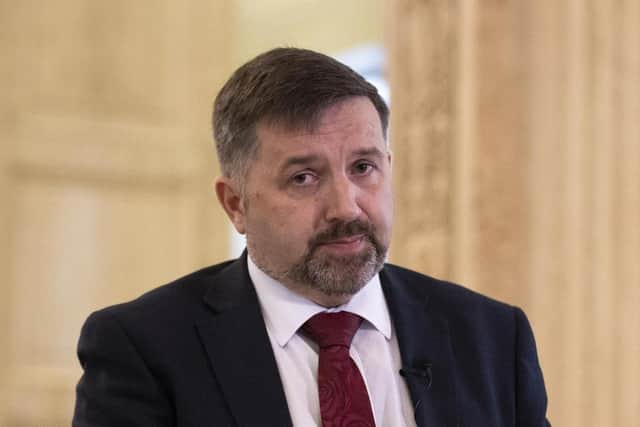Coronavirus NI: Accident & Emergency unit closure amid Covid pressure is not inevitable, Robin Swann insists
and live on Freeview channel 276
Robin Swann said it is “not inevitable” that the numbers attending A&E will reach such a level that one will have to temporarily close its doors to new admissions, but he acknowledged it remains a possibility.
Covid-19 cases, winter pressures and treatment backlogs caused by both the pandemic and wider systemic problems with healthcare delivery are combining to put huge pressure on Northern Ireland’s hospital system, with A&Es on the front line of the crisis.
Advertisement
Hide AdAdvertisement
Hide AdTreatment and admission times have soared as medics struggle to cope with the demand for services.
Mr Swann was asked about the current situation as he attended the official opening of the Ulster Hospital’s new Acute Services Block in Dundonald.
The state of the art facility will house general medical, stroke, renal, gynaecology and elderly care wards from this weekend. The Ulster Hospital’s ED will move to the £115 million building next spring.
The minister said of the potential for a temporary closure of an emergency department: “We’ll do everything we can, our trust technicians, our trust staff are doing everything they can.
Advertisement
Hide AdAdvertisement
Hide Ad“What we’re asking for is the public to play their part as well in regards to how they actually access our medical facilities.


“It’s not inevitable. I don’t want that to happen. The people working in our trusts, the people working in our EDs, don’t want that to happen either.
“But I think it’s right that we should put out that precautionary message that that is what could happen, but nobody wants it to get there.”
Mr Swann said the public have a key part to play in avoiding that nightmare scenario and he encouraged anyone who has not yet been vaccinated against Covid-19 to come forward for a jab.
Advertisement
Hide AdAdvertisement
Hide AdThe minister was also asked about the ongoing divisions within the Stormont Executive on the issue of whether mandatory vaccine passports should be introduced for entry to hospitality venues.
The Executive has advised venues to carry out Covid entry checks and an official app was rolled out this week to enable people to show proof of their vaccine status.
However, the administration has stopped short of making it a legal requirement of entry, similar to the system operating in the Irish Republic.
The issue has divided the Stormont administration, with the SDLP and Alliance Party calling for legally enforceable Covid passports for nightlife venues.
Advertisement
Hide AdAdvertisement
Hide AdMr Swann, who has expressed concerns about a mandatory system, was asked whether case numbers are reaching the point where such a step is unavoidable.
The minister said there is no specific data threshold that would trigger the introduction of legally enforceable checks.
“There is no single trigger point, there is no single point in data that will see us doing that,” he said.
“It’s about trajectory, it’s about speed of infection, it’s about the level of infection, but it’s also about the pressures that’s being put on our hospital systems as well.
Advertisement
Hide AdAdvertisement
Hide Ad“It’s about using all those measures, all those changes in dynamics that come together to the point where we say we have to step in and do that little bit more, that additional step.”
He said case numbers in Northern Ireland have “plateaued” at their current high level.
“We’re not seeing the increases that we’re seeing in other jurisdiction at this minute in time, so we’ll keep monitoring that, I would like to see that decrease,” he said.
“It’s not getting worse. I would prefer it to get better.”
The minister was given a tour of the hospital block after cutting a ribbon during Thursday morning’s opening ceremony.
“Today marks another major achievement for the hospital and the South Eastern Trust,” he said.
“These facilities will provide patients with state of the art services befitting the 21st century.”